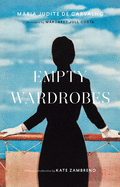
Originally published in 1966 and available now for the first time in English, Empty Wardrobes by Portuguese author, painter and journalist Maria Judite de Carvalho (1921-1998) is a harsh and funny domestic drama that lays bare the casual cruelties of patriarchy. Carvalho's sardonic tragedy is elegantly interpreted by British translator Margaret Jull Costa. This edition also features a new, vibrant introduction by Kate Zambreno.
When her husband, Duarte, dies, Dora Rosário and their young daughter, Lisa, are left destitute. Duarte's passivity made him professionally unambitious to the point of irresponsibility, yet Dora remains fanatically loyal to his memory even as she endures the humiliations of poverty (and the backhanded remarks of Duarte's mother, Ana, who blames Dora for Duarte's lack of accomplishment). A stroke of luck lands Dora a well-paying job at an antique store Lisa nicknames "The Museum," but after years of uneasy truce, Ana drops a bomb that shatters Dora's equilibrium for a second time: shortly before his death, Duarte had confided to his mother that he intended to leave Dora for another woman. The revelation stuns Dora, setting off a chain of events that will have ruinous consequences.
Carvalho's delicate balancing of dreamlike melancholy and caustic humor make Empty Wardrobes feel at times like a fairy tale or religious parable. Instead of being transformed into seafoam or salt, Carvalho's shamed women are reduced to functionless objects like those that populate the Museum--intriguing to contemplate but defined irrevocably by the imposed obsolescence of the time and place in which they exist. --Devon Ashby, sales & marketing assistant, Shelf Awareness

